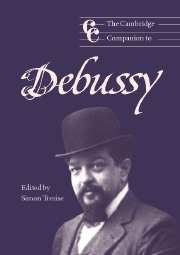Book contents
- Frontmatter
- Introduction
- Part I Man, musician and culture
- Part II Musical explorations
- 4 Debussy on stage
- 5 The prosaic Debussy
- 6 Debussy and expression
- 7 Exploring the erotic in Debussy's music
- 8 Debussy and nature
- Part III Musical techniques
- Part IV Performance and assessment
- Notes
- Select bibliography
- Index
5 - The prosaic Debussy
from Part II - Musical explorations
Published online by Cambridge University Press: 28 September 2011
- Frontmatter
- Introduction
- Part I Man, musician and culture
- Part II Musical explorations
- 4 Debussy on stage
- 5 The prosaic Debussy
- 6 Debussy and expression
- 7 Exploring the erotic in Debussy's music
- 8 Debussy and nature
- Part III Musical techniques
- Part IV Performance and assessment
- Notes
- Select bibliography
- Index
Summary
As the conventional distinction between recitative and aria weakened in late-nineteenth-century opera under the Wagnerian assault, it was only natural that other ready-made forms should be more closely scrutinised, among them the use of metrical verse and rhyme for musical settings. France proved to be particularly fertile soil for such debate. As Hugh Macdonald has pointed out:
French poetry had always contained a degree of artificial emphasis that required rules and conventions to hold poetic forms in check. French composers found themselves setting verse which might be stressed in one way according to metrical convention, but differently if read in an ordinary speaking voice. The temptation to abandon verse for prose was thus greater for French composers than elsewhere…
Macdonald quotes Gounod's eloquent preface to his unpublished opera George Dandin in which the composer claims that ‘The infinite variety of stress, in prose, offers the musician quite new horizons which will save him from monotony and uniformity.’
Whether the young Debussy ever read Gounod's words we do not know. What is certain is that among his café acquaintances was the poet and full-time aesthete Catulle Mendès, who had his own solution to the facture of librettos:
Certainly I'm not hostile to the idea of prose in opera. It may well lead to curious effects. But don't you think that what's wrong with some contemporary operas is the uniformity in the structure of the libretto? Poetry has a considerable number of different rhythms at its disposal. Need I remind you how many there are in Banville? Why, when it comes to opera, should we not use these rhythms to lend the libretto variety, picturesqueness, colour and originality? But more often than not, people use the alexandrine or lines of eight or ten syllables which, in bulk, give the spectator an impression of fatigue and monotony.
- Type
- Chapter
- Information
- The Cambridge Companion to Debussy , pp. 84 - 100Publisher: Cambridge University PressPrint publication year: 2003
- 1
- Cited by



